Analyzing Sociological Issues in Healthcare Organizations in Australia
VerifiedAdded on 2023/04/11
|12
|2899
|362
Essay
AI Summary
This essay delves into the sociological issues prevalent in Australian healthcare organizations, examining how these issues hinder both patient care and societal development. It emphasizes the need for practice change, incorporating sociocultural and theoretical perspectives to move towards patient-centered care. The essay highlights the complexities arising from the interplay of different disciplines within healthcare, focusing on the impact of neoliberal reforms on the healthcare framework, particularly concerning social disturbances and health inequalities. It employs Weber's social stratification theory and Functionalism theory to understand the implications and deficiencies in healthcare delivery. The analysis covers the effects of power differentials, gender imbalances, and organizational factors on teamwork and patient care, ultimately advocating for addressing existing gaps to improve the future of healthcare in Australia. Desklib provides access to this and many other solved assignments for students.
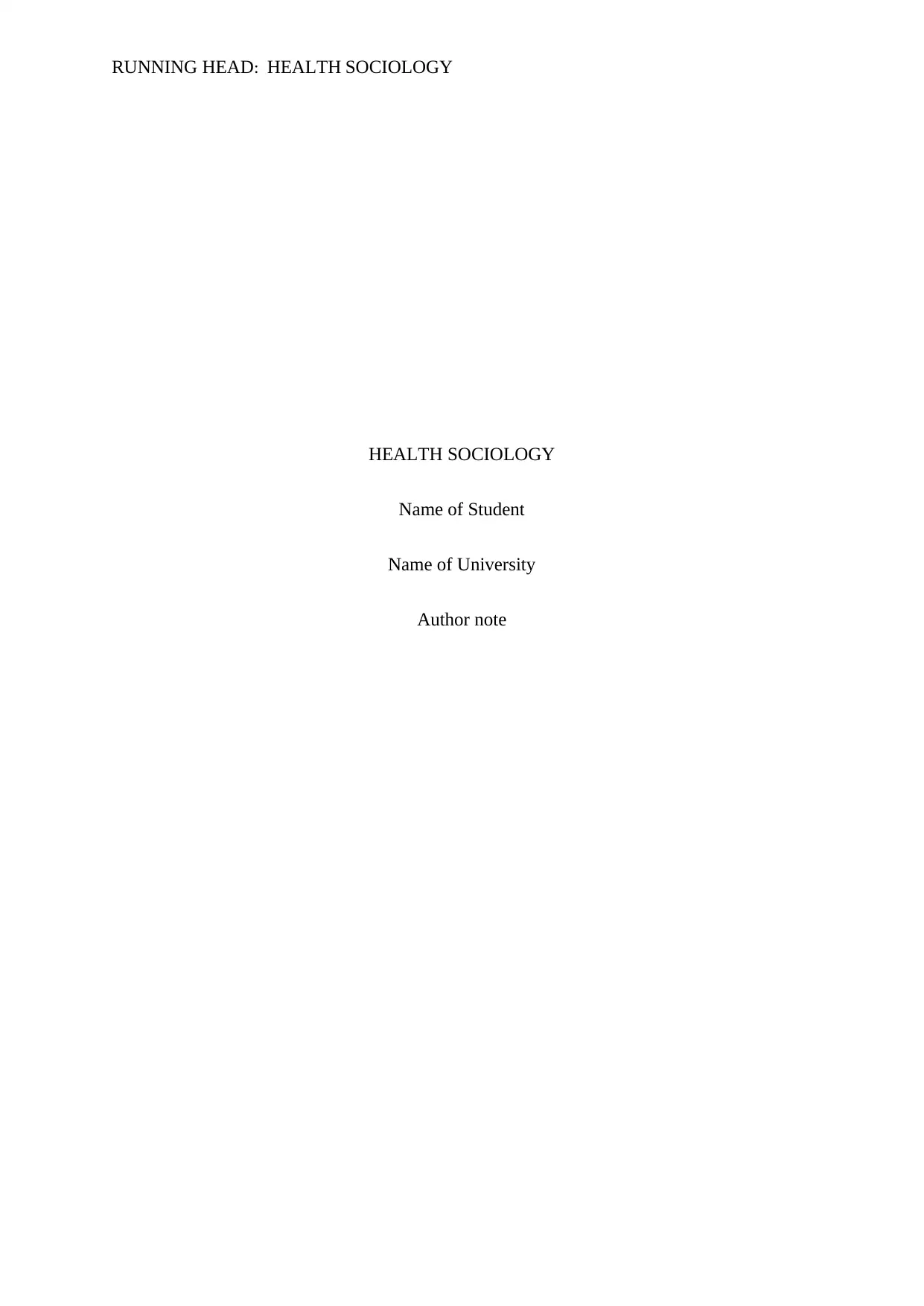
RUNNING HEAD: HEALTH SOCIOLOGY
HEALTH SOCIOLOGY
Name of Student
Name of University
Author note
HEALTH SOCIOLOGY
Name of Student
Name of University
Author note
Paraphrase This Document
Need a fresh take? Get an instant paraphrase of this document with our AI Paraphraser
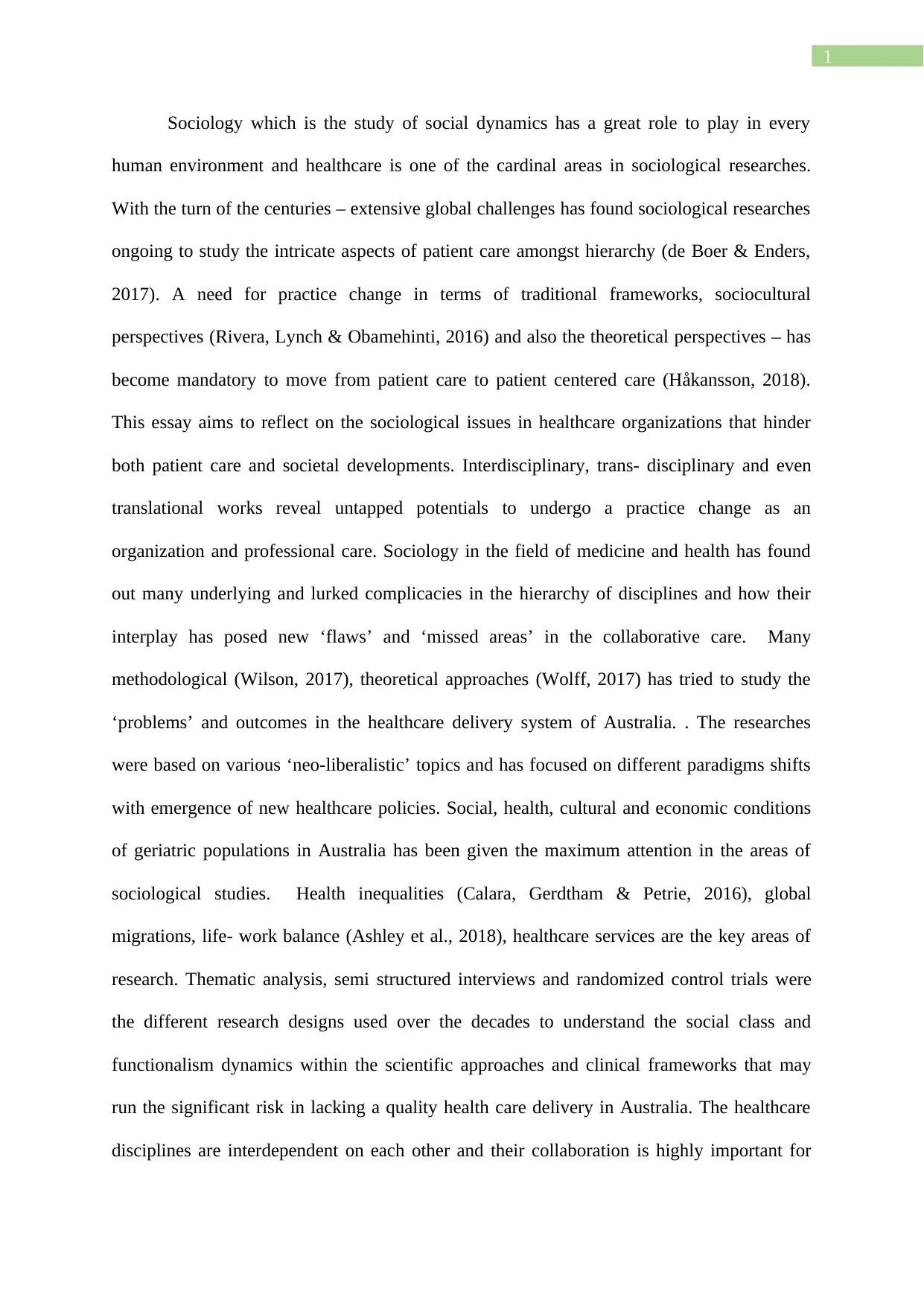
1
Sociology which is the study of social dynamics has a great role to play in every
human environment and healthcare is one of the cardinal areas in sociological researches.
With the turn of the centuries – extensive global challenges has found sociological researches
ongoing to study the intricate aspects of patient care amongst hierarchy (de Boer & Enders,
2017). A need for practice change in terms of traditional frameworks, sociocultural
perspectives (Rivera, Lynch & Obamehinti, 2016) and also the theoretical perspectives – has
become mandatory to move from patient care to patient centered care (Håkansson, 2018).
This essay aims to reflect on the sociological issues in healthcare organizations that hinder
both patient care and societal developments. Interdisciplinary, trans- disciplinary and even
translational works reveal untapped potentials to undergo a practice change as an
organization and professional care. Sociology in the field of medicine and health has found
out many underlying and lurked complicacies in the hierarchy of disciplines and how their
interplay has posed new ‘flaws’ and ‘missed areas’ in the collaborative care. Many
methodological (Wilson, 2017), theoretical approaches (Wolff, 2017) has tried to study the
‘problems’ and outcomes in the healthcare delivery system of Australia. . The researches
were based on various ‘neo-liberalistic’ topics and has focused on different paradigms shifts
with emergence of new healthcare policies. Social, health, cultural and economic conditions
of geriatric populations in Australia has been given the maximum attention in the areas of
sociological studies. Health inequalities (Calara, Gerdtham & Petrie, 2016), global
migrations, life- work balance (Ashley et al., 2018), healthcare services are the key areas of
research. Thematic analysis, semi structured interviews and randomized control trials were
the different research designs used over the decades to understand the social class and
functionalism dynamics within the scientific approaches and clinical frameworks that may
run the significant risk in lacking a quality health care delivery in Australia. The healthcare
disciplines are interdependent on each other and their collaboration is highly important for
Sociology which is the study of social dynamics has a great role to play in every
human environment and healthcare is one of the cardinal areas in sociological researches.
With the turn of the centuries – extensive global challenges has found sociological researches
ongoing to study the intricate aspects of patient care amongst hierarchy (de Boer & Enders,
2017). A need for practice change in terms of traditional frameworks, sociocultural
perspectives (Rivera, Lynch & Obamehinti, 2016) and also the theoretical perspectives – has
become mandatory to move from patient care to patient centered care (Håkansson, 2018).
This essay aims to reflect on the sociological issues in healthcare organizations that hinder
both patient care and societal developments. Interdisciplinary, trans- disciplinary and even
translational works reveal untapped potentials to undergo a practice change as an
organization and professional care. Sociology in the field of medicine and health has found
out many underlying and lurked complicacies in the hierarchy of disciplines and how their
interplay has posed new ‘flaws’ and ‘missed areas’ in the collaborative care. Many
methodological (Wilson, 2017), theoretical approaches (Wolff, 2017) has tried to study the
‘problems’ and outcomes in the healthcare delivery system of Australia. . The researches
were based on various ‘neo-liberalistic’ topics and has focused on different paradigms shifts
with emergence of new healthcare policies. Social, health, cultural and economic conditions
of geriatric populations in Australia has been given the maximum attention in the areas of
sociological studies. Health inequalities (Calara, Gerdtham & Petrie, 2016), global
migrations, life- work balance (Ashley et al., 2018), healthcare services are the key areas of
research. Thematic analysis, semi structured interviews and randomized control trials were
the different research designs used over the decades to understand the social class and
functionalism dynamics within the scientific approaches and clinical frameworks that may
run the significant risk in lacking a quality health care delivery in Australia. The healthcare
disciplines are interdependent on each other and their collaboration is highly important for
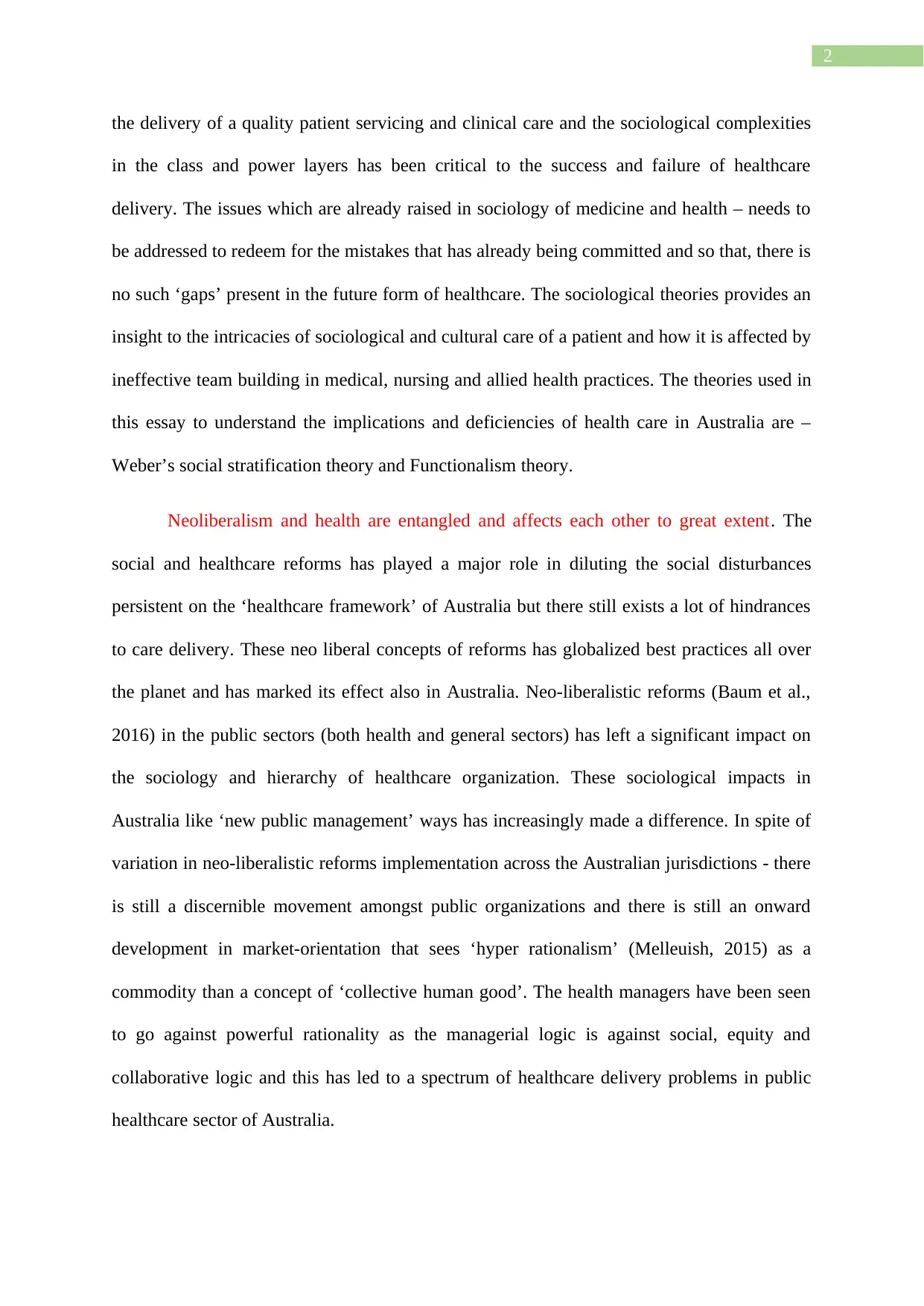
2
the delivery of a quality patient servicing and clinical care and the sociological complexities
in the class and power layers has been critical to the success and failure of healthcare
delivery. The issues which are already raised in sociology of medicine and health – needs to
be addressed to redeem for the mistakes that has already being committed and so that, there is
no such ‘gaps’ present in the future form of healthcare. The sociological theories provides an
insight to the intricacies of sociological and cultural care of a patient and how it is affected by
ineffective team building in medical, nursing and allied health practices. The theories used in
this essay to understand the implications and deficiencies of health care in Australia are –
Weber’s social stratification theory and Functionalism theory.
Neoliberalism and health are entangled and affects each other to great extent. The
social and healthcare reforms has played a major role in diluting the social disturbances
persistent on the ‘healthcare framework’ of Australia but there still exists a lot of hindrances
to care delivery. These neo liberal concepts of reforms has globalized best practices all over
the planet and has marked its effect also in Australia. Neo-liberalistic reforms (Baum et al.,
2016) in the public sectors (both health and general sectors) has left a significant impact on
the sociology and hierarchy of healthcare organization. These sociological impacts in
Australia like ‘new public management’ ways has increasingly made a difference. In spite of
variation in neo-liberalistic reforms implementation across the Australian jurisdictions - there
is still a discernible movement amongst public organizations and there is still an onward
development in market-orientation that sees ‘hyper rationalism’ (Melleuish, 2015) as a
commodity than a concept of ‘collective human good’. The health managers have been seen
to go against powerful rationality as the managerial logic is against social, equity and
collaborative logic and this has led to a spectrum of healthcare delivery problems in public
healthcare sector of Australia.
the delivery of a quality patient servicing and clinical care and the sociological complexities
in the class and power layers has been critical to the success and failure of healthcare
delivery. The issues which are already raised in sociology of medicine and health – needs to
be addressed to redeem for the mistakes that has already being committed and so that, there is
no such ‘gaps’ present in the future form of healthcare. The sociological theories provides an
insight to the intricacies of sociological and cultural care of a patient and how it is affected by
ineffective team building in medical, nursing and allied health practices. The theories used in
this essay to understand the implications and deficiencies of health care in Australia are –
Weber’s social stratification theory and Functionalism theory.
Neoliberalism and health are entangled and affects each other to great extent. The
social and healthcare reforms has played a major role in diluting the social disturbances
persistent on the ‘healthcare framework’ of Australia but there still exists a lot of hindrances
to care delivery. These neo liberal concepts of reforms has globalized best practices all over
the planet and has marked its effect also in Australia. Neo-liberalistic reforms (Baum et al.,
2016) in the public sectors (both health and general sectors) has left a significant impact on
the sociology and hierarchy of healthcare organization. These sociological impacts in
Australia like ‘new public management’ ways has increasingly made a difference. In spite of
variation in neo-liberalistic reforms implementation across the Australian jurisdictions - there
is still a discernible movement amongst public organizations and there is still an onward
development in market-orientation that sees ‘hyper rationalism’ (Melleuish, 2015) as a
commodity than a concept of ‘collective human good’. The health managers have been seen
to go against powerful rationality as the managerial logic is against social, equity and
collaborative logic and this has led to a spectrum of healthcare delivery problems in public
healthcare sector of Australia.
⊘ This is a preview!⊘
Do you want full access?
Subscribe today to unlock all pages.

Trusted by 1+ million students worldwide
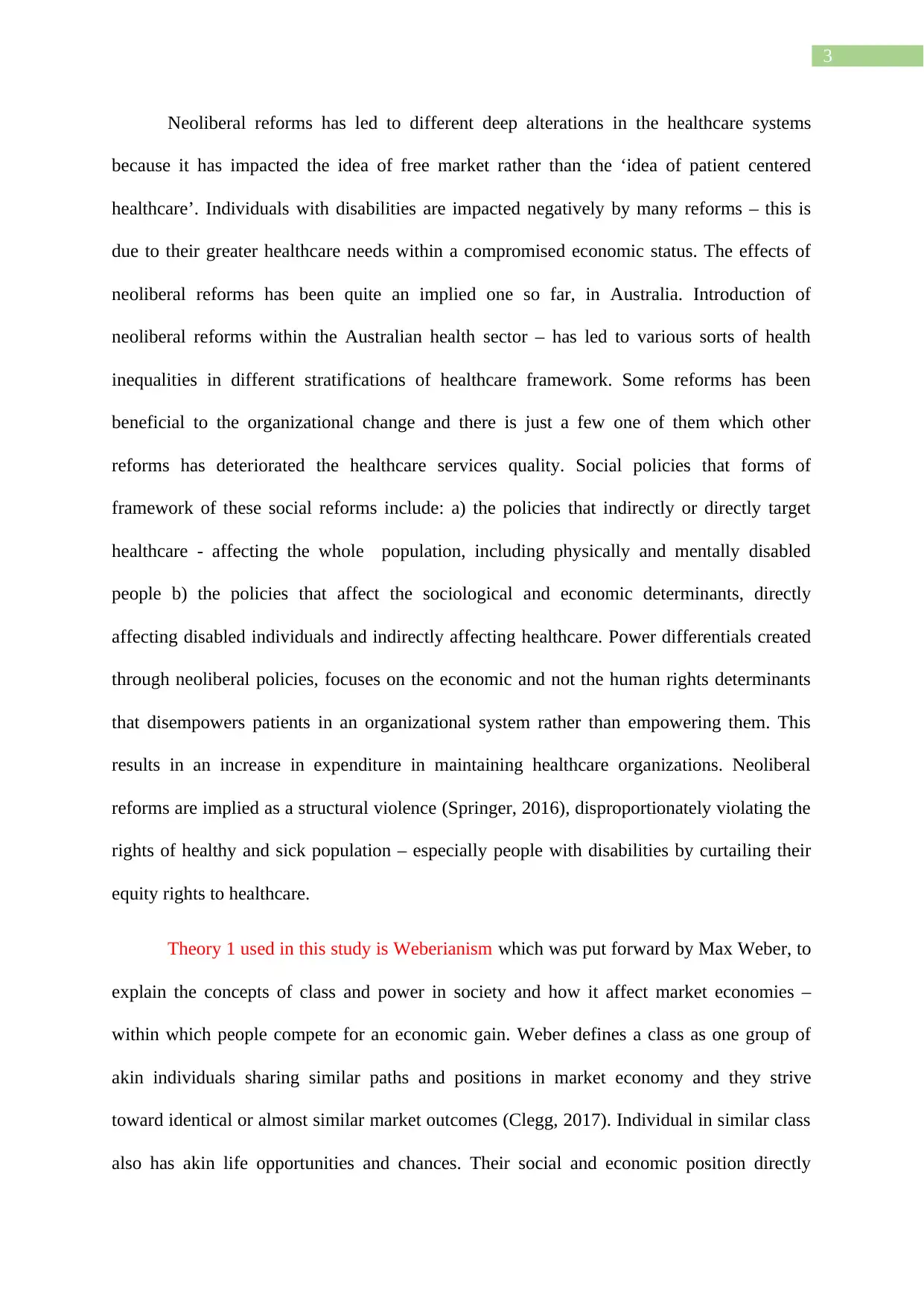
3
Neoliberal reforms has led to different deep alterations in the healthcare systems
because it has impacted the idea of free market rather than the ‘idea of patient centered
healthcare’. Individuals with disabilities are impacted negatively by many reforms – this is
due to their greater healthcare needs within a compromised economic status. The effects of
neoliberal reforms has been quite an implied one so far, in Australia. Introduction of
neoliberal reforms within the Australian health sector – has led to various sorts of health
inequalities in different stratifications of healthcare framework. Some reforms has been
beneficial to the organizational change and there is just a few one of them which other
reforms has deteriorated the healthcare services quality. Social policies that forms of
framework of these social reforms include: a) the policies that indirectly or directly target
healthcare - affecting the whole population, including physically and mentally disabled
people b) the policies that affect the sociological and economic determinants, directly
affecting disabled individuals and indirectly affecting healthcare. Power differentials created
through neoliberal policies, focuses on the economic and not the human rights determinants
that disempowers patients in an organizational system rather than empowering them. This
results in an increase in expenditure in maintaining healthcare organizations. Neoliberal
reforms are implied as a structural violence (Springer, 2016), disproportionately violating the
rights of healthy and sick population – especially people with disabilities by curtailing their
equity rights to healthcare.
Theory 1 used in this study is Weberianism which was put forward by Max Weber, to
explain the concepts of class and power in society and how it affect market economies –
within which people compete for an economic gain. Weber defines a class as one group of
akin individuals sharing similar paths and positions in market economy and they strive
toward identical or almost similar market outcomes (Clegg, 2017). Individual in similar class
also has akin life opportunities and chances. Their social and economic position directly
Neoliberal reforms has led to different deep alterations in the healthcare systems
because it has impacted the idea of free market rather than the ‘idea of patient centered
healthcare’. Individuals with disabilities are impacted negatively by many reforms – this is
due to their greater healthcare needs within a compromised economic status. The effects of
neoliberal reforms has been quite an implied one so far, in Australia. Introduction of
neoliberal reforms within the Australian health sector – has led to various sorts of health
inequalities in different stratifications of healthcare framework. Some reforms has been
beneficial to the organizational change and there is just a few one of them which other
reforms has deteriorated the healthcare services quality. Social policies that forms of
framework of these social reforms include: a) the policies that indirectly or directly target
healthcare - affecting the whole population, including physically and mentally disabled
people b) the policies that affect the sociological and economic determinants, directly
affecting disabled individuals and indirectly affecting healthcare. Power differentials created
through neoliberal policies, focuses on the economic and not the human rights determinants
that disempowers patients in an organizational system rather than empowering them. This
results in an increase in expenditure in maintaining healthcare organizations. Neoliberal
reforms are implied as a structural violence (Springer, 2016), disproportionately violating the
rights of healthy and sick population – especially people with disabilities by curtailing their
equity rights to healthcare.
Theory 1 used in this study is Weberianism which was put forward by Max Weber, to
explain the concepts of class and power in society and how it affect market economies –
within which people compete for an economic gain. Weber defines a class as one group of
akin individuals sharing similar paths and positions in market economy and they strive
toward identical or almost similar market outcomes (Clegg, 2017). Individual in similar class
also has akin life opportunities and chances. Their social and economic position directly
Paraphrase This Document
Need a fresh take? Get an instant paraphrase of this document with our AI Paraphraser
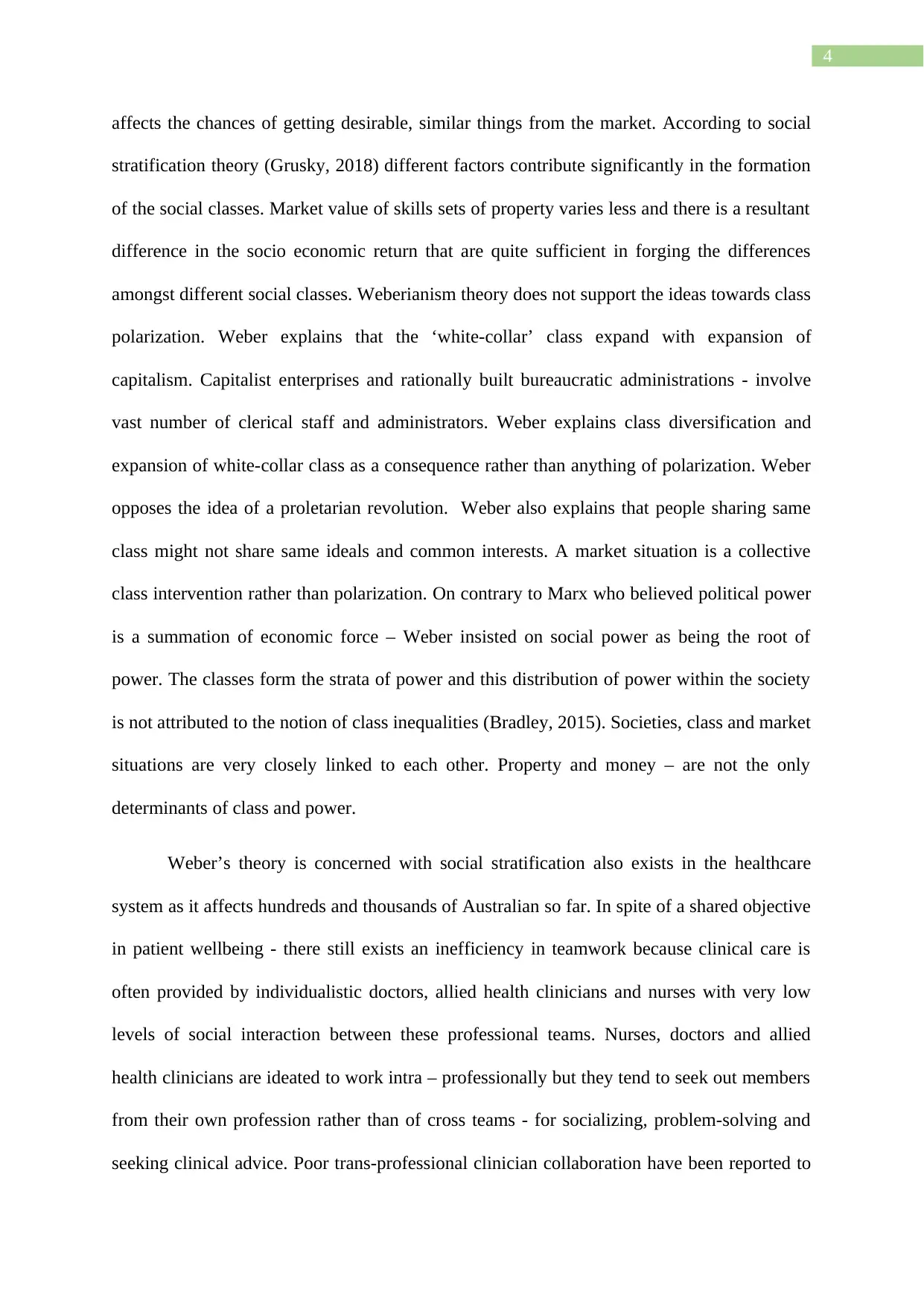
4
affects the chances of getting desirable, similar things from the market. According to social
stratification theory (Grusky, 2018) different factors contribute significantly in the formation
of the social classes. Market value of skills sets of property varies less and there is a resultant
difference in the socio economic return that are quite sufficient in forging the differences
amongst different social classes. Weberianism theory does not support the ideas towards class
polarization. Weber explains that the ‘white-collar’ class expand with expansion of
capitalism. Capitalist enterprises and rationally built bureaucratic administrations - involve
vast number of clerical staff and administrators. Weber explains class diversification and
expansion of white-collar class as a consequence rather than anything of polarization. Weber
opposes the idea of a proletarian revolution. Weber also explains that people sharing same
class might not share same ideals and common interests. A market situation is a collective
class intervention rather than polarization. On contrary to Marx who believed political power
is a summation of economic force – Weber insisted on social power as being the root of
power. The classes form the strata of power and this distribution of power within the society
is not attributed to the notion of class inequalities (Bradley, 2015). Societies, class and market
situations are very closely linked to each other. Property and money – are not the only
determinants of class and power.
Weber’s theory is concerned with social stratification also exists in the healthcare
system as it affects hundreds and thousands of Australian so far. In spite of a shared objective
in patient wellbeing - there still exists an inefficiency in teamwork because clinical care is
often provided by individualistic doctors, allied health clinicians and nurses with very low
levels of social interaction between these professional teams. Nurses, doctors and allied
health clinicians are ideated to work intra – professionally but they tend to seek out members
from their own profession rather than of cross teams - for socializing, problem-solving and
seeking clinical advice. Poor trans-professional clinician collaboration have been reported to
affects the chances of getting desirable, similar things from the market. According to social
stratification theory (Grusky, 2018) different factors contribute significantly in the formation
of the social classes. Market value of skills sets of property varies less and there is a resultant
difference in the socio economic return that are quite sufficient in forging the differences
amongst different social classes. Weberianism theory does not support the ideas towards class
polarization. Weber explains that the ‘white-collar’ class expand with expansion of
capitalism. Capitalist enterprises and rationally built bureaucratic administrations - involve
vast number of clerical staff and administrators. Weber explains class diversification and
expansion of white-collar class as a consequence rather than anything of polarization. Weber
opposes the idea of a proletarian revolution. Weber also explains that people sharing same
class might not share same ideals and common interests. A market situation is a collective
class intervention rather than polarization. On contrary to Marx who believed political power
is a summation of economic force – Weber insisted on social power as being the root of
power. The classes form the strata of power and this distribution of power within the society
is not attributed to the notion of class inequalities (Bradley, 2015). Societies, class and market
situations are very closely linked to each other. Property and money – are not the only
determinants of class and power.
Weber’s theory is concerned with social stratification also exists in the healthcare
system as it affects hundreds and thousands of Australian so far. In spite of a shared objective
in patient wellbeing - there still exists an inefficiency in teamwork because clinical care is
often provided by individualistic doctors, allied health clinicians and nurses with very low
levels of social interaction between these professional teams. Nurses, doctors and allied
health clinicians are ideated to work intra – professionally but they tend to seek out members
from their own profession rather than of cross teams - for socializing, problem-solving and
seeking clinical advice. Poor trans-professional clinician collaboration have been reported to
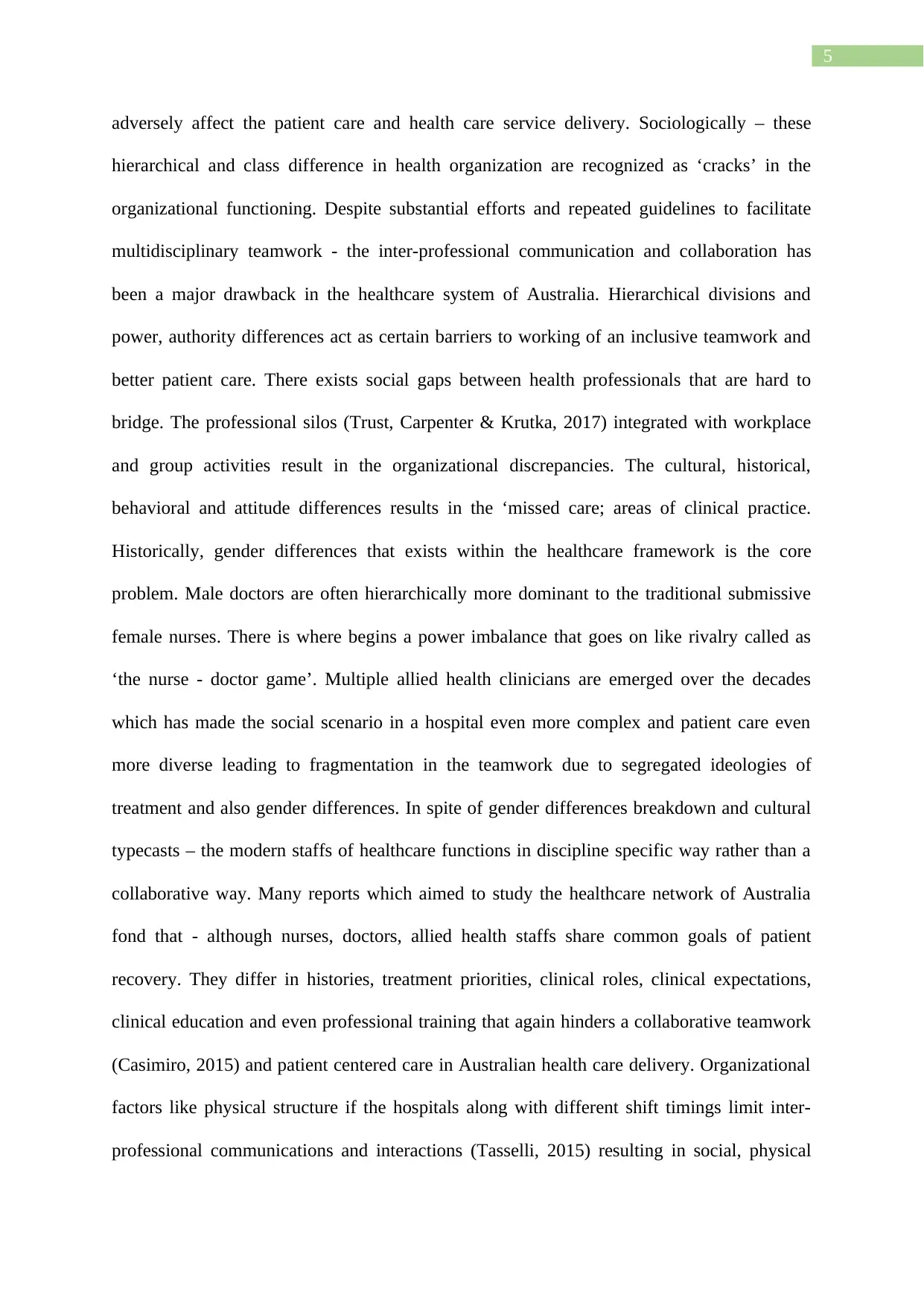
5
adversely affect the patient care and health care service delivery. Sociologically – these
hierarchical and class difference in health organization are recognized as ‘cracks’ in the
organizational functioning. Despite substantial efforts and repeated guidelines to facilitate
multidisciplinary teamwork - the inter-professional communication and collaboration has
been a major drawback in the healthcare system of Australia. Hierarchical divisions and
power, authority differences act as certain barriers to working of an inclusive teamwork and
better patient care. There exists social gaps between health professionals that are hard to
bridge. The professional silos (Trust, Carpenter & Krutka, 2017) integrated with workplace
and group activities result in the organizational discrepancies. The cultural, historical,
behavioral and attitude differences results in the ‘missed care; areas of clinical practice.
Historically, gender differences that exists within the healthcare framework is the core
problem. Male doctors are often hierarchically more dominant to the traditional submissive
female nurses. There is where begins a power imbalance that goes on like rivalry called as
‘the nurse - doctor game’. Multiple allied health clinicians are emerged over the decades
which has made the social scenario in a hospital even more complex and patient care even
more diverse leading to fragmentation in the teamwork due to segregated ideologies of
treatment and also gender differences. In spite of gender differences breakdown and cultural
typecasts – the modern staffs of healthcare functions in discipline specific way rather than a
collaborative way. Many reports which aimed to study the healthcare network of Australia
fond that - although nurses, doctors, allied health staffs share common goals of patient
recovery. They differ in histories, treatment priorities, clinical roles, clinical expectations,
clinical education and even professional training that again hinders a collaborative teamwork
(Casimiro, 2015) and patient centered care in Australian health care delivery. Organizational
factors like physical structure if the hospitals along with different shift timings limit inter-
professional communications and interactions (Tasselli, 2015) resulting in social, physical
adversely affect the patient care and health care service delivery. Sociologically – these
hierarchical and class difference in health organization are recognized as ‘cracks’ in the
organizational functioning. Despite substantial efforts and repeated guidelines to facilitate
multidisciplinary teamwork - the inter-professional communication and collaboration has
been a major drawback in the healthcare system of Australia. Hierarchical divisions and
power, authority differences act as certain barriers to working of an inclusive teamwork and
better patient care. There exists social gaps between health professionals that are hard to
bridge. The professional silos (Trust, Carpenter & Krutka, 2017) integrated with workplace
and group activities result in the organizational discrepancies. The cultural, historical,
behavioral and attitude differences results in the ‘missed care; areas of clinical practice.
Historically, gender differences that exists within the healthcare framework is the core
problem. Male doctors are often hierarchically more dominant to the traditional submissive
female nurses. There is where begins a power imbalance that goes on like rivalry called as
‘the nurse - doctor game’. Multiple allied health clinicians are emerged over the decades
which has made the social scenario in a hospital even more complex and patient care even
more diverse leading to fragmentation in the teamwork due to segregated ideologies of
treatment and also gender differences. In spite of gender differences breakdown and cultural
typecasts – the modern staffs of healthcare functions in discipline specific way rather than a
collaborative way. Many reports which aimed to study the healthcare network of Australia
fond that - although nurses, doctors, allied health staffs share common goals of patient
recovery. They differ in histories, treatment priorities, clinical roles, clinical expectations,
clinical education and even professional training that again hinders a collaborative teamwork
(Casimiro, 2015) and patient centered care in Australian health care delivery. Organizational
factors like physical structure if the hospitals along with different shift timings limit inter-
professional communications and interactions (Tasselli, 2015) resulting in social, physical
⊘ This is a preview!⊘
Do you want full access?
Subscribe today to unlock all pages.

Trusted by 1+ million students worldwide
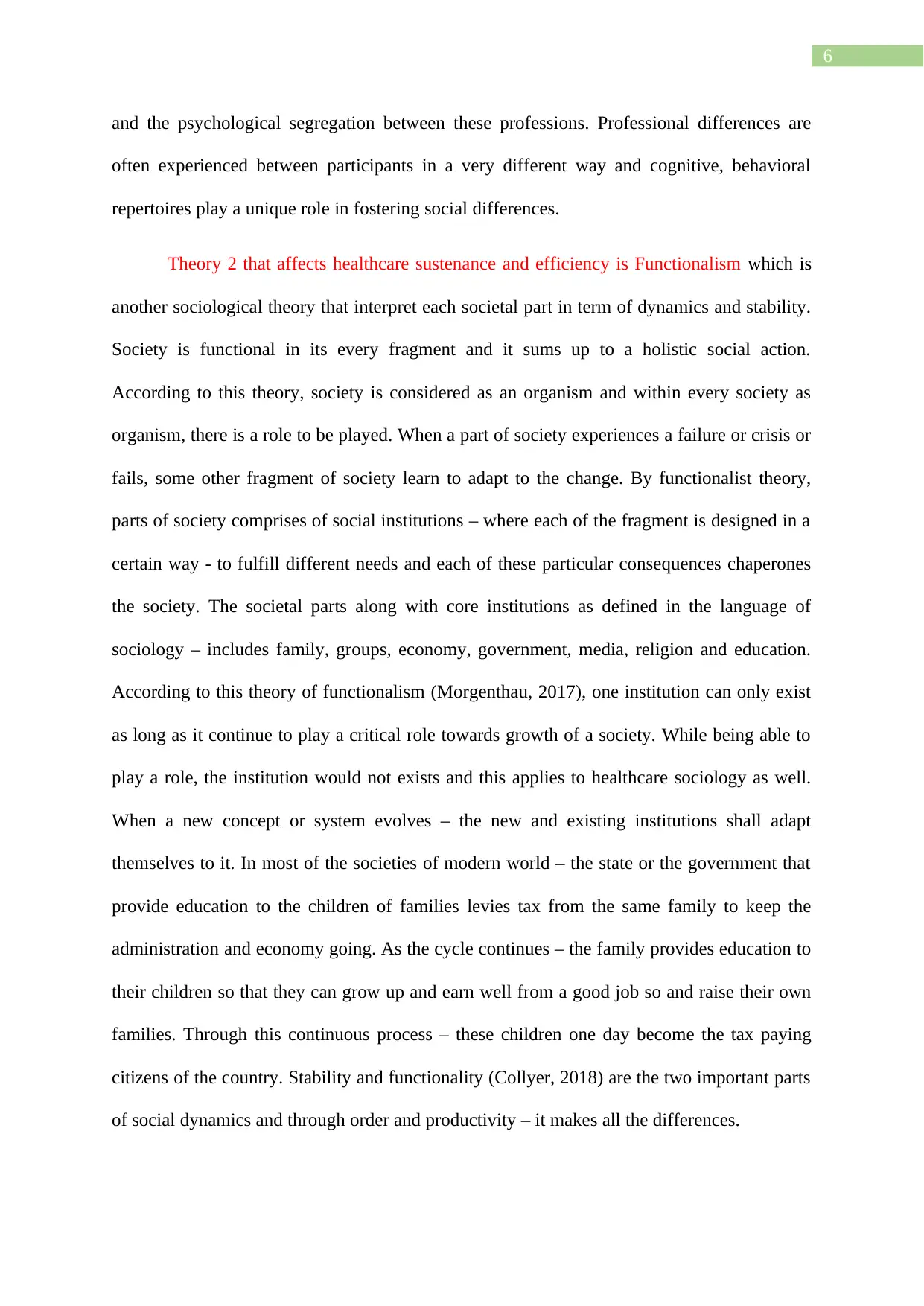
6
and the psychological segregation between these professions. Professional differences are
often experienced between participants in a very different way and cognitive, behavioral
repertoires play a unique role in fostering social differences.
Theory 2 that affects healthcare sustenance and efficiency is Functionalism which is
another sociological theory that interpret each societal part in term of dynamics and stability.
Society is functional in its every fragment and it sums up to a holistic social action.
According to this theory, society is considered as an organism and within every society as
organism, there is a role to be played. When a part of society experiences a failure or crisis or
fails, some other fragment of society learn to adapt to the change. By functionalist theory,
parts of society comprises of social institutions – where each of the fragment is designed in a
certain way - to fulfill different needs and each of these particular consequences chaperones
the society. The societal parts along with core institutions as defined in the language of
sociology – includes family, groups, economy, government, media, religion and education.
According to this theory of functionalism (Morgenthau, 2017), one institution can only exist
as long as it continue to play a critical role towards growth of a society. While being able to
play a role, the institution would not exists and this applies to healthcare sociology as well.
When a new concept or system evolves – the new and existing institutions shall adapt
themselves to it. In most of the societies of modern world – the state or the government that
provide education to the children of families levies tax from the same family to keep the
administration and economy going. As the cycle continues – the family provides education to
their children so that they can grow up and earn well from a good job so and raise their own
families. Through this continuous process – these children one day become the tax paying
citizens of the country. Stability and functionality (Collyer, 2018) are the two important parts
of social dynamics and through order and productivity – it makes all the differences.
and the psychological segregation between these professions. Professional differences are
often experienced between participants in a very different way and cognitive, behavioral
repertoires play a unique role in fostering social differences.
Theory 2 that affects healthcare sustenance and efficiency is Functionalism which is
another sociological theory that interpret each societal part in term of dynamics and stability.
Society is functional in its every fragment and it sums up to a holistic social action.
According to this theory, society is considered as an organism and within every society as
organism, there is a role to be played. When a part of society experiences a failure or crisis or
fails, some other fragment of society learn to adapt to the change. By functionalist theory,
parts of society comprises of social institutions – where each of the fragment is designed in a
certain way - to fulfill different needs and each of these particular consequences chaperones
the society. The societal parts along with core institutions as defined in the language of
sociology – includes family, groups, economy, government, media, religion and education.
According to this theory of functionalism (Morgenthau, 2017), one institution can only exist
as long as it continue to play a critical role towards growth of a society. While being able to
play a role, the institution would not exists and this applies to healthcare sociology as well.
When a new concept or system evolves – the new and existing institutions shall adapt
themselves to it. In most of the societies of modern world – the state or the government that
provide education to the children of families levies tax from the same family to keep the
administration and economy going. As the cycle continues – the family provides education to
their children so that they can grow up and earn well from a good job so and raise their own
families. Through this continuous process – these children one day become the tax paying
citizens of the country. Stability and functionality (Collyer, 2018) are the two important parts
of social dynamics and through order and productivity – it makes all the differences.
Paraphrase This Document
Need a fresh take? Get an instant paraphrase of this document with our AI Paraphraser
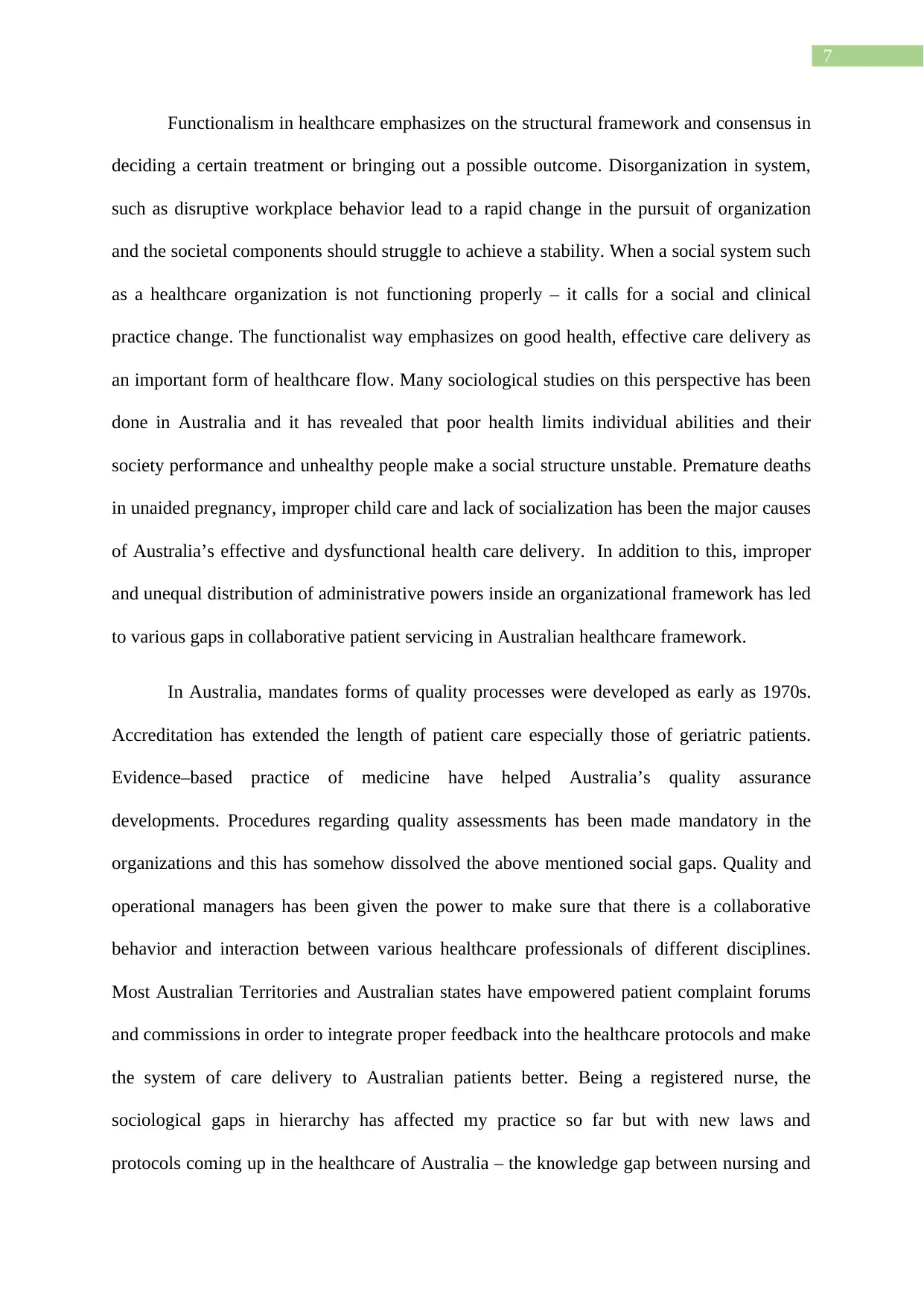
7
Functionalism in healthcare emphasizes on the structural framework and consensus in
deciding a certain treatment or bringing out a possible outcome. Disorganization in system,
such as disruptive workplace behavior lead to a rapid change in the pursuit of organization
and the societal components should struggle to achieve a stability. When a social system such
as a healthcare organization is not functioning properly – it calls for a social and clinical
practice change. The functionalist way emphasizes on good health, effective care delivery as
an important form of healthcare flow. Many sociological studies on this perspective has been
done in Australia and it has revealed that poor health limits individual abilities and their
society performance and unhealthy people make a social structure unstable. Premature deaths
in unaided pregnancy, improper child care and lack of socialization has been the major causes
of Australia’s effective and dysfunctional health care delivery. In addition to this, improper
and unequal distribution of administrative powers inside an organizational framework has led
to various gaps in collaborative patient servicing in Australian healthcare framework.
In Australia, mandates forms of quality processes were developed as early as 1970s.
Accreditation has extended the length of patient care especially those of geriatric patients.
Evidence–based practice of medicine have helped Australia’s quality assurance
developments. Procedures regarding quality assessments has been made mandatory in the
organizations and this has somehow dissolved the above mentioned social gaps. Quality and
operational managers has been given the power to make sure that there is a collaborative
behavior and interaction between various healthcare professionals of different disciplines.
Most Australian Territories and Australian states have empowered patient complaint forums
and commissions in order to integrate proper feedback into the healthcare protocols and make
the system of care delivery to Australian patients better. Being a registered nurse, the
sociological gaps in hierarchy has affected my practice so far but with new laws and
protocols coming up in the healthcare of Australia – the knowledge gap between nursing and
Functionalism in healthcare emphasizes on the structural framework and consensus in
deciding a certain treatment or bringing out a possible outcome. Disorganization in system,
such as disruptive workplace behavior lead to a rapid change in the pursuit of organization
and the societal components should struggle to achieve a stability. When a social system such
as a healthcare organization is not functioning properly – it calls for a social and clinical
practice change. The functionalist way emphasizes on good health, effective care delivery as
an important form of healthcare flow. Many sociological studies on this perspective has been
done in Australia and it has revealed that poor health limits individual abilities and their
society performance and unhealthy people make a social structure unstable. Premature deaths
in unaided pregnancy, improper child care and lack of socialization has been the major causes
of Australia’s effective and dysfunctional health care delivery. In addition to this, improper
and unequal distribution of administrative powers inside an organizational framework has led
to various gaps in collaborative patient servicing in Australian healthcare framework.
In Australia, mandates forms of quality processes were developed as early as 1970s.
Accreditation has extended the length of patient care especially those of geriatric patients.
Evidence–based practice of medicine have helped Australia’s quality assurance
developments. Procedures regarding quality assessments has been made mandatory in the
organizations and this has somehow dissolved the above mentioned social gaps. Quality and
operational managers has been given the power to make sure that there is a collaborative
behavior and interaction between various healthcare professionals of different disciplines.
Most Australian Territories and Australian states have empowered patient complaint forums
and commissions in order to integrate proper feedback into the healthcare protocols and make
the system of care delivery to Australian patients better. Being a registered nurse, the
sociological gaps in hierarchy has affected my practice so far but with new laws and
protocols coming up in the healthcare of Australia – the knowledge gap between nursing and
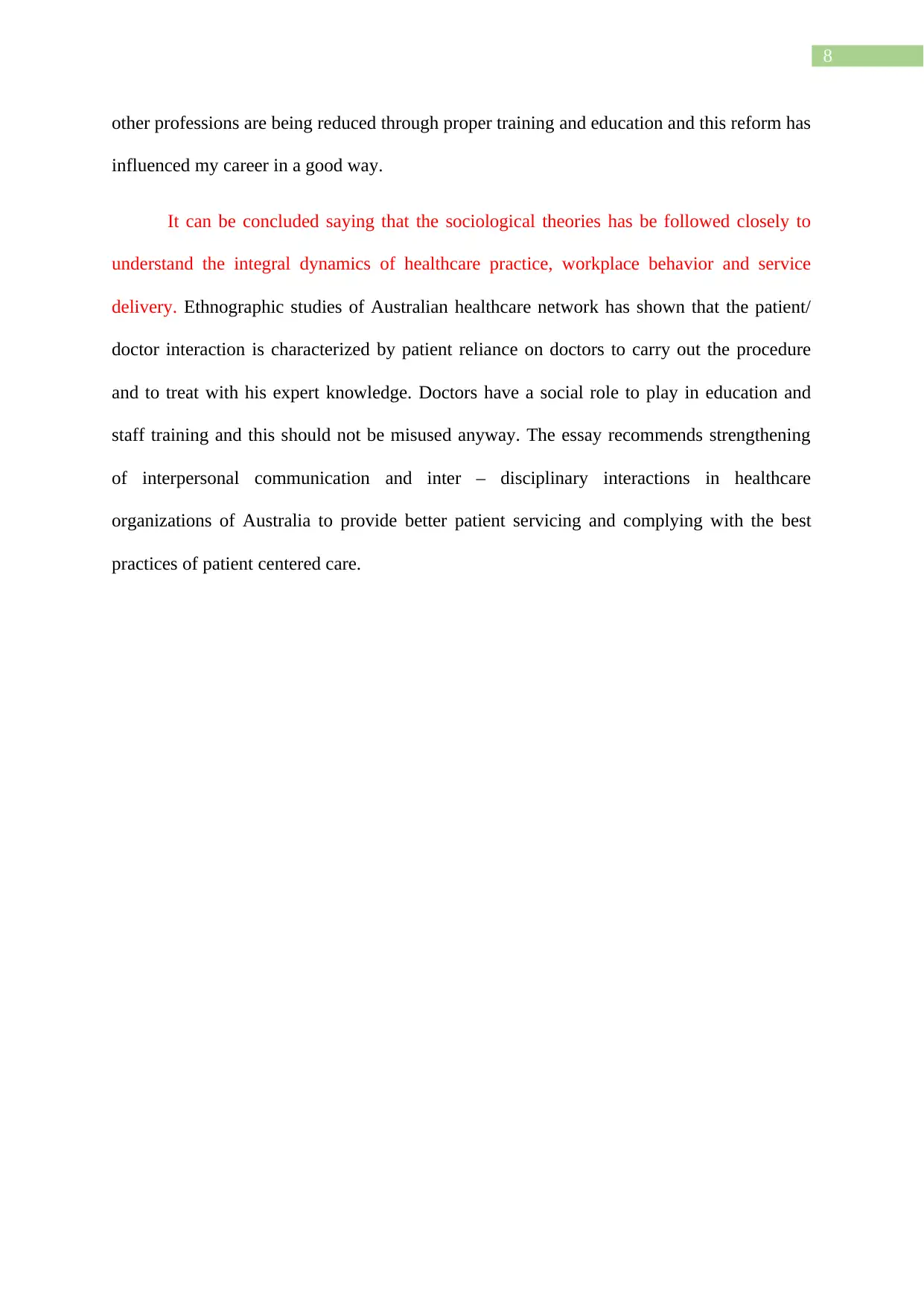
8
other professions are being reduced through proper training and education and this reform has
influenced my career in a good way.
It can be concluded saying that the sociological theories has be followed closely to
understand the integral dynamics of healthcare practice, workplace behavior and service
delivery. Ethnographic studies of Australian healthcare network has shown that the patient/
doctor interaction is characterized by patient reliance on doctors to carry out the procedure
and to treat with his expert knowledge. Doctors have a social role to play in education and
staff training and this should not be misused anyway. The essay recommends strengthening
of interpersonal communication and inter – disciplinary interactions in healthcare
organizations of Australia to provide better patient servicing and complying with the best
practices of patient centered care.
other professions are being reduced through proper training and education and this reform has
influenced my career in a good way.
It can be concluded saying that the sociological theories has be followed closely to
understand the integral dynamics of healthcare practice, workplace behavior and service
delivery. Ethnographic studies of Australian healthcare network has shown that the patient/
doctor interaction is characterized by patient reliance on doctors to carry out the procedure
and to treat with his expert knowledge. Doctors have a social role to play in education and
staff training and this should not be misused anyway. The essay recommends strengthening
of interpersonal communication and inter – disciplinary interactions in healthcare
organizations of Australia to provide better patient servicing and complying with the best
practices of patient centered care.
⊘ This is a preview!⊘
Do you want full access?
Subscribe today to unlock all pages.

Trusted by 1+ million students worldwide
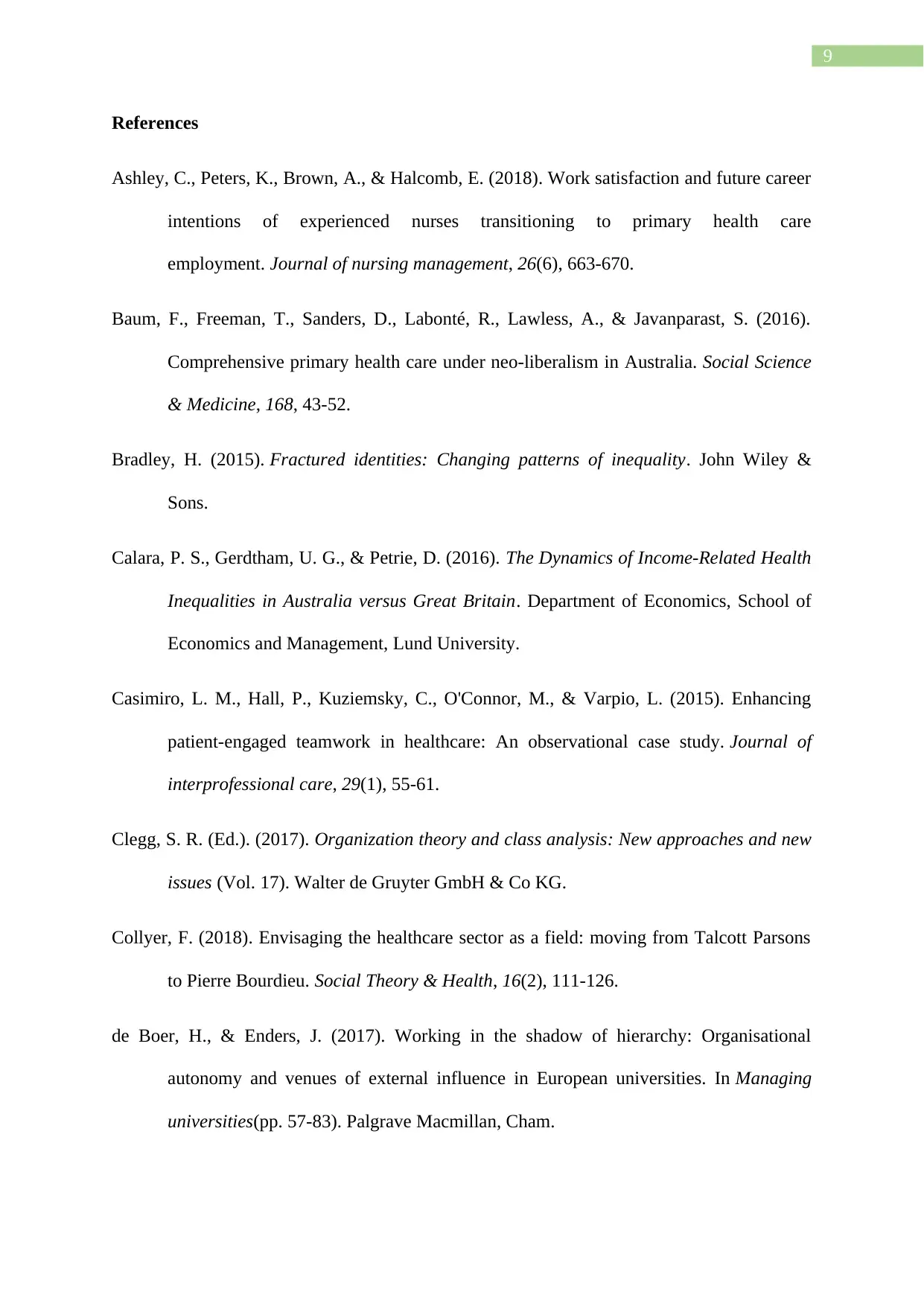
9
References
Ashley, C., Peters, K., Brown, A., & Halcomb, E. (2018). Work satisfaction and future career
intentions of experienced nurses transitioning to primary health care
employment. Journal of nursing management, 26(6), 663-670.
Baum, F., Freeman, T., Sanders, D., Labonté, R., Lawless, A., & Javanparast, S. (2016).
Comprehensive primary health care under neo-liberalism in Australia. Social Science
& Medicine, 168, 43-52.
Bradley, H. (2015). Fractured identities: Changing patterns of inequality. John Wiley &
Sons.
Calara, P. S., Gerdtham, U. G., & Petrie, D. (2016). The Dynamics of Income-Related Health
Inequalities in Australia versus Great Britain. Department of Economics, School of
Economics and Management, Lund University.
Casimiro, L. M., Hall, P., Kuziemsky, C., O'Connor, M., & Varpio, L. (2015). Enhancing
patient-engaged teamwork in healthcare: An observational case study. Journal of
interprofessional care, 29(1), 55-61.
Clegg, S. R. (Ed.). (2017). Organization theory and class analysis: New approaches and new
issues (Vol. 17). Walter de Gruyter GmbH & Co KG.
Collyer, F. (2018). Envisaging the healthcare sector as a field: moving from Talcott Parsons
to Pierre Bourdieu. Social Theory & Health, 16(2), 111-126.
de Boer, H., & Enders, J. (2017). Working in the shadow of hierarchy: Organisational
autonomy and venues of external influence in European universities. In Managing
universities(pp. 57-83). Palgrave Macmillan, Cham.
References
Ashley, C., Peters, K., Brown, A., & Halcomb, E. (2018). Work satisfaction and future career
intentions of experienced nurses transitioning to primary health care
employment. Journal of nursing management, 26(6), 663-670.
Baum, F., Freeman, T., Sanders, D., Labonté, R., Lawless, A., & Javanparast, S. (2016).
Comprehensive primary health care under neo-liberalism in Australia. Social Science
& Medicine, 168, 43-52.
Bradley, H. (2015). Fractured identities: Changing patterns of inequality. John Wiley &
Sons.
Calara, P. S., Gerdtham, U. G., & Petrie, D. (2016). The Dynamics of Income-Related Health
Inequalities in Australia versus Great Britain. Department of Economics, School of
Economics and Management, Lund University.
Casimiro, L. M., Hall, P., Kuziemsky, C., O'Connor, M., & Varpio, L. (2015). Enhancing
patient-engaged teamwork in healthcare: An observational case study. Journal of
interprofessional care, 29(1), 55-61.
Clegg, S. R. (Ed.). (2017). Organization theory and class analysis: New approaches and new
issues (Vol. 17). Walter de Gruyter GmbH & Co KG.
Collyer, F. (2018). Envisaging the healthcare sector as a field: moving from Talcott Parsons
to Pierre Bourdieu. Social Theory & Health, 16(2), 111-126.
de Boer, H., & Enders, J. (2017). Working in the shadow of hierarchy: Organisational
autonomy and venues of external influence in European universities. In Managing
universities(pp. 57-83). Palgrave Macmillan, Cham.
Paraphrase This Document
Need a fresh take? Get an instant paraphrase of this document with our AI Paraphraser
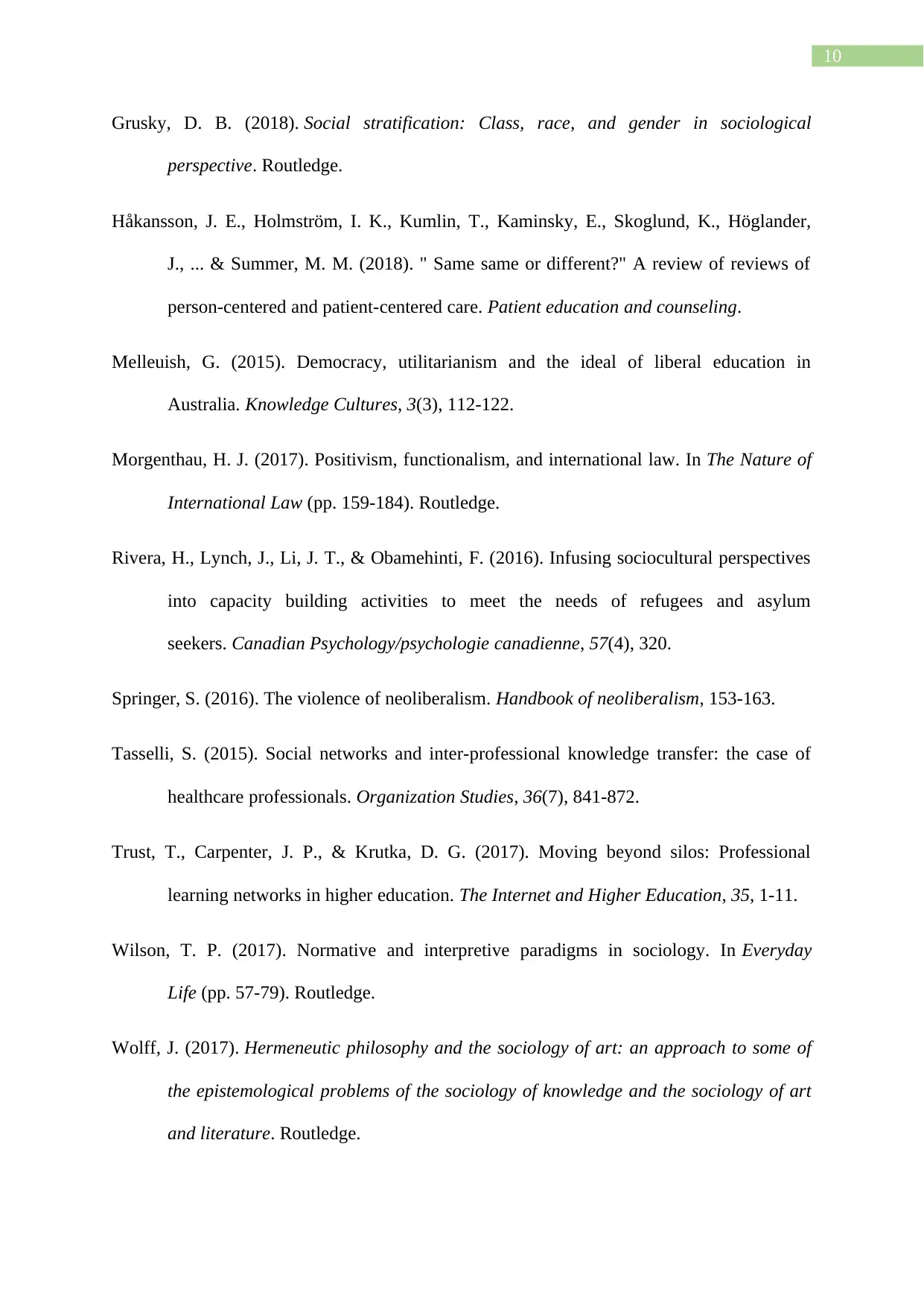
10
Grusky, D. B. (2018). Social stratification: Class, race, and gender in sociological
perspective. Routledge.
Håkansson, J. E., Holmström, I. K., Kumlin, T., Kaminsky, E., Skoglund, K., Höglander,
J., ... & Summer, M. M. (2018). " Same same or different?" A review of reviews of
person-centered and patient-centered care. Patient education and counseling.
Melleuish, G. (2015). Democracy, utilitarianism and the ideal of liberal education in
Australia. Knowledge Cultures, 3(3), 112-122.
Morgenthau, H. J. (2017). Positivism, functionalism, and international law. In The Nature of
International Law (pp. 159-184). Routledge.
Rivera, H., Lynch, J., Li, J. T., & Obamehinti, F. (2016). Infusing sociocultural perspectives
into capacity building activities to meet the needs of refugees and asylum
seekers. Canadian Psychology/psychologie canadienne, 57(4), 320.
Springer, S. (2016). The violence of neoliberalism. Handbook of neoliberalism, 153-163.
Tasselli, S. (2015). Social networks and inter-professional knowledge transfer: the case of
healthcare professionals. Organization Studies, 36(7), 841-872.
Trust, T., Carpenter, J. P., & Krutka, D. G. (2017). Moving beyond silos: Professional
learning networks in higher education. The Internet and Higher Education, 35, 1-11.
Wilson, T. P. (2017). Normative and interpretive paradigms in sociology. In Everyday
Life (pp. 57-79). Routledge.
Wolff, J. (2017). Hermeneutic philosophy and the sociology of art: an approach to some of
the epistemological problems of the sociology of knowledge and the sociology of art
and literature. Routledge.
Grusky, D. B. (2018). Social stratification: Class, race, and gender in sociological
perspective. Routledge.
Håkansson, J. E., Holmström, I. K., Kumlin, T., Kaminsky, E., Skoglund, K., Höglander,
J., ... & Summer, M. M. (2018). " Same same or different?" A review of reviews of
person-centered and patient-centered care. Patient education and counseling.
Melleuish, G. (2015). Democracy, utilitarianism and the ideal of liberal education in
Australia. Knowledge Cultures, 3(3), 112-122.
Morgenthau, H. J. (2017). Positivism, functionalism, and international law. In The Nature of
International Law (pp. 159-184). Routledge.
Rivera, H., Lynch, J., Li, J. T., & Obamehinti, F. (2016). Infusing sociocultural perspectives
into capacity building activities to meet the needs of refugees and asylum
seekers. Canadian Psychology/psychologie canadienne, 57(4), 320.
Springer, S. (2016). The violence of neoliberalism. Handbook of neoliberalism, 153-163.
Tasselli, S. (2015). Social networks and inter-professional knowledge transfer: the case of
healthcare professionals. Organization Studies, 36(7), 841-872.
Trust, T., Carpenter, J. P., & Krutka, D. G. (2017). Moving beyond silos: Professional
learning networks in higher education. The Internet and Higher Education, 35, 1-11.
Wilson, T. P. (2017). Normative and interpretive paradigms in sociology. In Everyday
Life (pp. 57-79). Routledge.
Wolff, J. (2017). Hermeneutic philosophy and the sociology of art: an approach to some of
the epistemological problems of the sociology of knowledge and the sociology of art
and literature. Routledge.

11
⊘ This is a preview!⊘
Do you want full access?
Subscribe today to unlock all pages.

Trusted by 1+ million students worldwide
1 out of 12
Related Documents
Your All-in-One AI-Powered Toolkit for Academic Success.
+13062052269
info@desklib.com
Available 24*7 on WhatsApp / Email
![[object Object]](/_next/static/media/star-bottom.7253800d.svg)
Unlock your academic potential
Copyright © 2020–2026 A2Z Services. All Rights Reserved. Developed and managed by ZUCOL.



